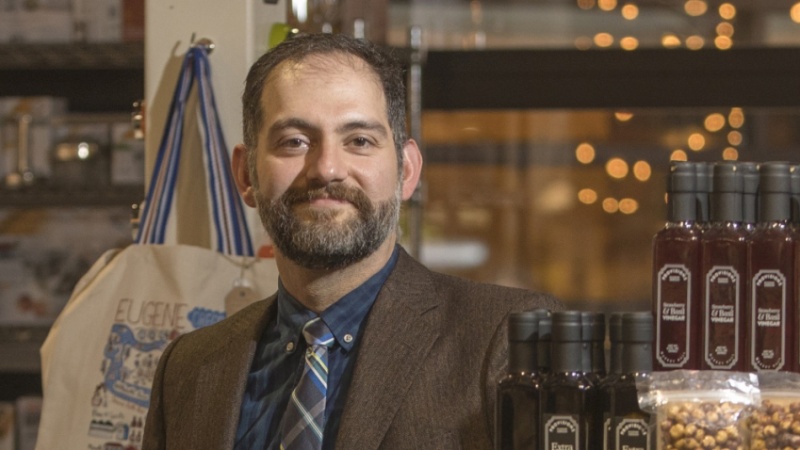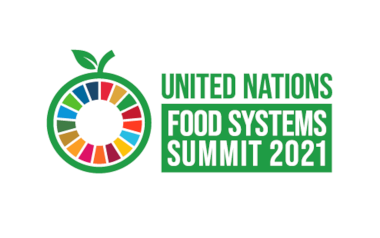Share Twitter Facebook Email Copy URL
The UN Rapporteur on the Right to Food, Michael Fakhri, criticised the Summit for focusing on the interests of multinational corporations that bear a high degree of responsibility for the food crisis. He warns of potential on-the-ground impacts, and proposes possible ways out of the situation. Agroecology as a tool of change.
This 23 September will mark the start of the United Nations’ Food Systems Summit, promoted by the World Economic Forum. Since it was announced last October, the Summit has faced numerous criticism from many different quarters, including members of the UN itself. Special rapporteurs and ex-officials from the UN warn about the increasingly worrisome influence of the concentrated private sector – Unilever, Bayer, Nestlé, Coca-Cola, Pepsico, Google, Amazon, Microsoft – on summits of this kind, which are aimed at agreeing on the general terms of a plan that then has an impact on countries’ public policies.
One of these critical voices is Michael Fakhri, the United Nations’ Rapporteur on the Right to Food. For Fakhri, this Summit is likely to be a waste of time and money for the UN’s Member States, and will not be of the slightest benefit to the peoples of the world – still less to the millions of people currently going hungry. By contrast, those who will benefit from the Summit are a handful of multinational corporations looking to secure their future business, along with certain NGOs and consultancy groups who act as advisers for the organisation of this type of international event.
The average person, in the cities and the rural areas alike, will nonetheless feel the impacts of this Summit over the coming years. For Fakhri, what is agreed on at the Summit will have an impact on the food plans that national governments put into practice in the future – plans that, based on the way events have been going, “are very likely to violate human rights”, the UN Rapporteur warns.
He worries that the UN will give the multinationals an influential and decisive power over how the food crisis will be responded to in a world where, according to FAO data, hunger has been growing since 2015. In 2020, a time when the Covid pandemic made everything worse, it is estimated that 700-800 million people went hungry.
Along with two previous rapporteurs, Fakhri denounced the fact that the organisers of the Summit overlooked established and more transparent bodies, such as the Committee on World Food Security, that could have been part of the discussions regarding food systems. “Flagrantly, perhaps deliberately, the Summit is diverting governments’ attention away from the Committee,” they stated. They also indicated that the Summit’s rules and agenda were set up by a small group that only pays attention to the interests of the multinationals. The proposals that come out of the Summit are thus likely to be “agricultural systems controlled by artificial intelligence, gene modification, and other high-tech solutions oriented towards large-scale agroindustry”, they warned.
Since the Summit was announced last October by the UN Secretary-General, António Guterres, Fakhri has released several documents highlighting the lack of a human rights perspective in the approach to food systems. One of them was a report presented to the UN’s Human Rights Council; another was specifically addressed to the organisers of the Summit, and another was a recent report for the UN General Assembly.

Photo: University of Oregon
Agencia Tierra Viva spoke from Buenos Aires, Argentina with Fakhri, who lives in the United States, where he is a Professor in the Faculty of Law at the University of Oregon.
Was there any response from the authorities at the Summit to your critiques and suggestions?
“No. The last thing I tried was to communicate with the authorities and give suggestions for how to include social organisations and movements that, up until now, have been opposed to the Summit. Because up until now, even if the Secretariat (authority) of the Summit met with them, they did not really listen to their demands, or really modify anything that they had been doing. I thought that this might be my last chance and submitted a proposal, but they rejected it. After that exchange, my message is: This Summit is not a people’s summit (as advertised by the Secretary-General of the UN) – it’s a waste of time. The Summit took two years to organise, cost approximately 24 million dollars, and required thousands of people working as volunteers. And when all is said and done, it won’t serve the people on the ground, in the fields, in the factories and the cities. The people who are most in need will see no benefit from this summit.”
And who will be benefiting from the Summit?
“From the start, it was clear that the main people who came up with the idea for the Summit were all linked to the World Economic Forum. They aren’t necessarily corporations themselves – none of the leaders of the Summit is a corporation. What they are is organisations that work in close collaboration with these corporations, that serve them, that say they are part of the solution. I asked the Summit organisers how they can say that the corporations are part of the solution when they are really part of the problem. Their response was: ‘Governments are also part of the problem.’ That should tell you a lot. Because governments aren’t the same as corporations. Governments, by design, even if they’re part of the problem, there’s at least a theory of accountability. Corporations, by design, are not accountable. They’re about limiting liability and creating profit. It’s hard to hold a corporation liable for human rights violations, we know this. Thus, the groups that will benefit include certain agricultural producers and food producers who want to give more power to corporations and feel comfortable working with them – plus the corporations themselves. What I don’t understand is why governments are ready to grant so much power, via the United Nations, to the consultants, scientists and experts who work with the corporations. Another beneficiary is the organisers of the Summit, that group of people who will be continuing their consultancy work and will continue to be treated like experts.”
Can you give some examples of these NGOs and companies, and the solutions they propose?
“The president of Action Track 2 (the action tracks are a kind of commission within the Summit) is Lawrence Haddad, Executive Director of the NGO known as GAIN (Global Alliance for Improved Nutrition). He wants to create an initiative for corporations to make pledges. That’s the solution, according to him – for the corporations to say: ‘We promise to fix the food system and create a better world.’ Another example: the organisers of the Summit created something known as ‘cross-cutting levers (or mechanisms) of change… ’. Whatever that actually means, there are supposed to be four such levers: Finance, Innovation, and Gender – and they tried to create one for Human Rights, but it didn’t work. The Finance component is led by the World Bank, and Innovation is led by the World Economic Forum. This way, they can pool together all their resources and be the ‘cross-cutting lever’ that can exert an influence on the entire Summit. And they will write a final report that will affect what people think about these topics. The other thing that the World Economic Forum did was to organise a meeting just before the opening of the Summit. The meeting was like a mirror-image of the entire Summit. It was attended by all the multinational corporations: Coca Cola, Unilever, Monsanto (or whatever they’re called now), Bayer, and all the leaders of the Summit – they sat together and set the tone before the process officially begins. Beyond that, it’s difficult to give concrete examples of the solutions they are proposing because, three weeks before the start of the Summit, no one really knows what results are expected.”
“Zero Hunger Pledge”. That’s the name of the initiative by GAIN, the NGO referred to above by Fakhri, that is one of the solutions being promoted by the Summit. “The pledge is a non-binding statement of the companies’ proposed operations and investment plans. It is not intended to create any legally enforceable rights or obligations on the company or its affiliates”, GAIN explains on its website. Among the main financers of this NGO are the multinationals BASF, Unilever and Arla Foods, along with the Bill and Melinda Gates Foundation and Rockefeller Foundation.
On-the-ground impact
What impact will the Summit have on the common people, the workers, families in rural regions, indigenous peoples?
“The effects will not be seen immediately, and that’s a problem in itself. The lack of immediate positive effects, during a pandemic, is a problem. In fact, the Summit will not be addressing the topic of Covid at all. Rather, it will be operating on the assumption of a post-Covid world – in other words, a fantasy. The Summit’s aim is to influence national governments. The greater part of its activities are dedicated to getting governments to announce general plans for how they will change their food systems. The Summit will connect these governments with investors and consultants with an interest in working with corporations. They will then advise the governments on how to change their food systems. We will thus start to see an increasing number of countries developing food plans.
The majority of countries have agricultural plans, but not food plans. So, now there will be more and more food plans designed and implemented in a way that – considering how things have been going – will very likely violate human rights. The on-the-ground effects of this will become evident within a few years.
In the meantime, the question to ask is how people involved in human rights struggles will continue their fight at the international level while at the same time encouraging people to protest at a local level. Because if governments feel enough pressure, at a national level, to create food plans based on human rights, this can have a neutralising effect on the Summit. When all is said and done, it’s always local power that is the most effective.“
On several occasions, you have maintained that the Summit is not taking the pandemic seriously. Why do you think this is happening?
“I don’t know. That’s the question that I kept asking the Secretariat of the Summit. I brought up this issue a year and a half ago, but they have failed to respond. I can think of a possible reason. The fact that they have not included Covid on the agenda, without publicly explaining the reason, speaks to how disconnected they are from reality, how distant they are from people’s immediate needs. It speaks to them being an elite, who have the luxury of not putting Covid on their agenda. Because, for the rest of the world, if you ask them how they are dealing with food problems, they have to address the issue of Covid – there’s no other option. The fact that the Summit Secretariat felt they could choose not to address this topic conveys, to me, that they have no idea of the real struggles people are facing.

Who bears responsibility for hunger?
You have stated, in multiple declarations and reports, that hunger is a more complex problem to tackle than the pandemic, and that it is not a problem of food scarcity but of political failures. Can you give an example of such failures?
“Hunger is always a political failure. It’s not only a failure of the government of the country where hunger is occurring. Our food systems, even the most local ones, are part of the world, and as such, they are affected by the world economy. Consequently, the political failure that causes hunger can also be a failure by other countries that hold an influence over the country that is suffering from hunger. In that sense, hunger is always a worldwide issue, and there are many parties that bear responsibility for it. At the worldwide level, the entire UN system is responsible,in the sense that people are trying to get governments to join together and coordinate their responses to the food crisis – which has been exacerbated by the pandemic – but a small number of powerful countries refuse to use the multilateral forums for doing so. The biggest forum, the UN Committee on World Food Security, is the ideal vehicle for governments, civil society, and other bodies to sit down and coordinate responses to the crisis; it’s highly inclusive. But there is a continual political blockade against this by the powerful countries that do not want to work together with others. They want to keep the power for themselves. This is an example of a political failure.”
To what extent are multinational agribusiness corporations responsible for hunger?
“Between 1960 and the present day, food production has increased by 300% – and yet, hunger has still increased. Agribusiness has focused on producing more, and more, and more food while ignoring questions such as: How is the food being produced? What damage might it be causing? What they have done with their growing influence over food systems is to promote the use of pesticides, genetically modified seeds, and monocultures. They have contributed to the reduction of biodiversity, which is not only one of the main issues affecting food systems today, but also one of the main problems of climate change. All because their primary focus is on profits and consolidating power. Now, they are trying to adapt, to be more ‘sustainable’, as they put it. But there’s no reason to expect that they will solve the problem.
Ultimately, the problem isn’t what they are doing, but power – who has the power. If you give power to a small group of people, in any situation, they’re not going to do a good job. If power is kept in the hands of the people, the people know what they need – they know it better than anyone. They’re capable of adapting to their particular contexts and ecosystems.
The difficulty is in getting people to work together, collaboratively. But that’s always a problem in a democracy, and it’s a good sort of problem. A bad problem is having to deal with concentrated power. Because, again, those who concentrate it are disconnected from reality. That’s the biggest problem. The Summit thus reflects a lot of the current problems of food systems in general.”
Possible paths of resistance
What’s your opinion on the counter-summit, Food Systems for People, organised by social activists and movements who criticise the Summit for its focus on the agenda of the multinational corporations?
“It’s inspiring: these groups got together, they represent millions of people, they don’t all think alike, and they even have contrary positions on some things. But they have been able to negotiate, overcome their differences, and find common ground in solidarity. That spirit of solidarity should be an inspiration to national governments as well. Because, if the people can achieve this on their own, governments ought to be capable of joining together, overcoming their differences, and serving the needs of the people. So, this counter-mobilisation that people are doing, under incredibly difficult circumstances, in the middle of a pandemic, I see it as an inspiration.”
As Rapporteur, what steps would you propose towards a solution to the world’s problems with food systems?
“First of all: that people get involved, if they aren’t already. In every city, community and country, there are sovereignty movements, food justice movements, farmers’ organisations, trade unions, cooperatives. The more people there are participating actively in local struggles, the better. As for governments: they have to try to find avenues of leadership. We only need a small group of governments to join together and put pressure on the agenda of the multinational corporations. To be defenders of food systems, to respect human rights. There are governments that can do it, but everyone is waiting for someone else to make the first move. I think there is a hope of bringing those countries together to form some type of coalition that will inspire and lead others. Through the experience of my work, I know that most governments want to do things the right way. But, again, there is a small clique of the powerful that is blocking everything. The system of the United Nations has both strengths and weaknesses. One of its strengths is that, when a majority of countries finds a way to unite together, they can influence the agenda, in a good way. This has worked in the past, and it can work again. The third thing I would suggest is that people build new relationships. Change occurs through the creation of new relationships and friendships. One example that has inspired me in this respect are the movements in India. They were led by organisations of farmers fighting for their human rights. And what happened was that the workers and the trade unions united with them in solidarity. The farmers and the workers don’t always get along well – it’s a complicated relationship. But they were able to develop a new bond in this case. So, I think that new relationships lead to new politics, new ideas, and that’s how change happens.”
In South America, they have now had more than three decades of the agribusiness model that combines genetically modified crops, agrotoxins and concentration of the land, and the governments keep promoting this as a form of development. What’s your opinion on this?
“There is a disconnection between food policies and trade policies, and this has an impact on how countries use the land. If a country is primarily oriented towards exports, it will encourage an approach where the land is oriented towards the production of commodities rather than food. This reflects a model of development wherein we produce commodities – as if we were a factory – sell to the international market, get money in return, invest it back in our country, and then use it to eat better and improve our quality of life. This is an economic model from the 1950s – the whole world implemented it. What we’ve seen, especially in the southern countries, is that reorienting the agricultural sector towards exports has had three significant results. First, there has been a reduction in biodiversity, affecting both the environment and people’s health, their physical health. Second, this reorientation towards exports has not improved socioeconomic conditions: a small group of rich people has simply become richer. We can see this in the World Trade Organization: the developing countries are not happy with international trade policies. The third result has been the creation of food insecurity in the countries in question: they export food, they import money, but the people go hungry. It’s absurd. You have an agriculture sector that ships food abroad while your people are hungry next door. No country is doing a good job of connecting the food system with the trade system. South America could be a good place for doing this, because it has agriculture, it has a history of popular movements, and trade has always been a topic of debate there, more so than in other regions.”
Investing in agroecology
Both you and former rapporteurs are proposing agroecology as one of the solutions to the food crisis. What would you say to those who claim that agroecology is a thing of the past, something primitive?
“Agroecology is based on longstanding traditions of food cultivation. It is powered by the knowledge and competence of the people who actually do the work: farmers, fishermen, shepherds and more. It’s rooted in specific traditions, but is dynamic at the same time. And it is future-oriented. The world we live in today started in 1970, when the Green Revolution started, and the corporatisation of agriculture started in a big way. It is a recent phenomenon, but look at the destruction that it has caused in a mere 50 years. Agroecology is thus new in the sense that we still haven’t committed, at a worldwide level, to consciously developing our food policies in a way that is integrated with ecological processes. Agroecology does have a history, but everything has a history. Agribusiness is a part of the history of industrial activity. They’ve taken agriculture and tied it to the history of factories, of industry. It wasn’t just any technological advancement – it was an advancement aimed at producing commodities to generate profits. Let’s bring agriculture back to the tradition of local knowledge and competence – of farmers, of indigenous peoples. But, again, we’re talking about a tradition that is new, updated for the present time. We need to create new technologies, invest money, scientific know-how, education and the like, and the result will be something new. Agroecology has techniques that have been proven to work. Because of climate change, ecosystems are changing at a very rapid rate. In that sense, agroecology is modern by definition, because it’s a direct response to an ecosystem that is new to us. It’s more dynamic and more resilient than industrial agriculture.”
In your most recent report, you stressed the need to invest in agroecology.
“Investment has to be directed at what is in keeping with human rights, with concern for ecological matters; power has to be placed in the hands of the people. Not enough investment is being made into agroecology. In my work, I have seen that many governments are interested. Many governments want to make this transformation, and it’s almost a matter of how rapidly they want to do so. That’s the question, really. I think that the problem with agroecology is that agribusiness is trying to do two things at the same time: on the one hand, to say that agroecology is irrelevant or not productive; and on the other, to say, ‘Ah, but we can do agroecology ourselves.’ They redefine it to serve their own ends, and that creates confusion. But I think that the clearer we are about the situation, the more governments will get involved and invest in agroecology, and the more rapidly change will occur. The solution is getting built, I just wish it were happening faster.”



